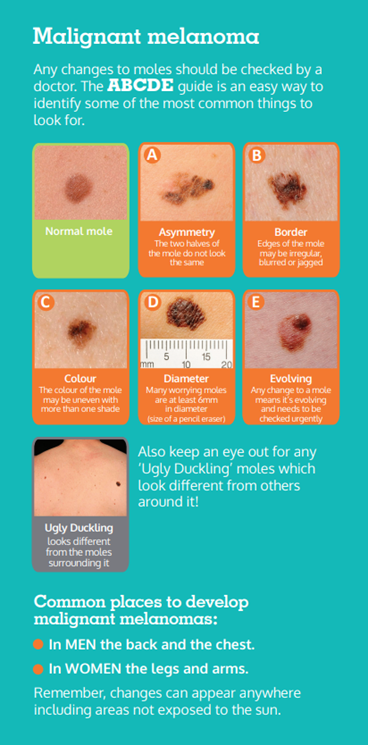The main cause of all types of skin cancer is ultraviolet (UV) light which comes from the sun or tanning beds. There are two main types of skin cancer, melanoma and non-melanoma skin cancers (NMSC). There are around 72,000 cases of NMSC and 14,500 cases of melanoma in the UK each year.
Anyone can develop skin cancer but you’re particularly at risk if you have fair skin, lots of moles or freckles, red or fair hair, pale coloured eyes, used tanning beds, a family history of skin cancer or had skin cancer before, or take medication which affects your immune system.
Get to know your skin
Getting to know your own skin will help you spot changes early and it’s important to know what’s normal. Check your skin once a month and report any changes without delay to your doctor.
Melanoma
Melanoma is the most dangerous form of skin cancer with around six people dying every day. Common places to develop melanomas in men are the back and chest, and in women on the legs and arms, but changes can appear anywhere.
Any changes to moles should be checked by a doctor. The ABCDE guide is an easy way to remember some of the most common things to look for.

Non-melanoma skin cancer
Non-melanoma skin cancer develops in the upper layers of the skin. It’s one of the most common types of cancer in the world. Non-melanoma skin cancer may first appear as:
- A new, unexplained skin change which appears suddenly.
- A spot or sore which continues to itch, hurt, scab, crust or bleed for more than four weeks or does not heal within four weeks.
- Ulcerated areas or patches where the skin has broken down and does not heal within four weeks.
There are two main types of this cancer known as squamous cell carcinoma (SCC) and basal cell carcinoma (BCC). SCC is fast growing while BCC develops slowly. If you notice any of the below changes to your skin you should discuss it with a doctor.
What to do if you notice changes like these
If you notice any changes in your skin like the above, go to your GP as soon as possible. Lots of GPs are now able to send a photo to a specialist dermatologist, which can make diagnosis (and any subsequent treatment) much quicker.
